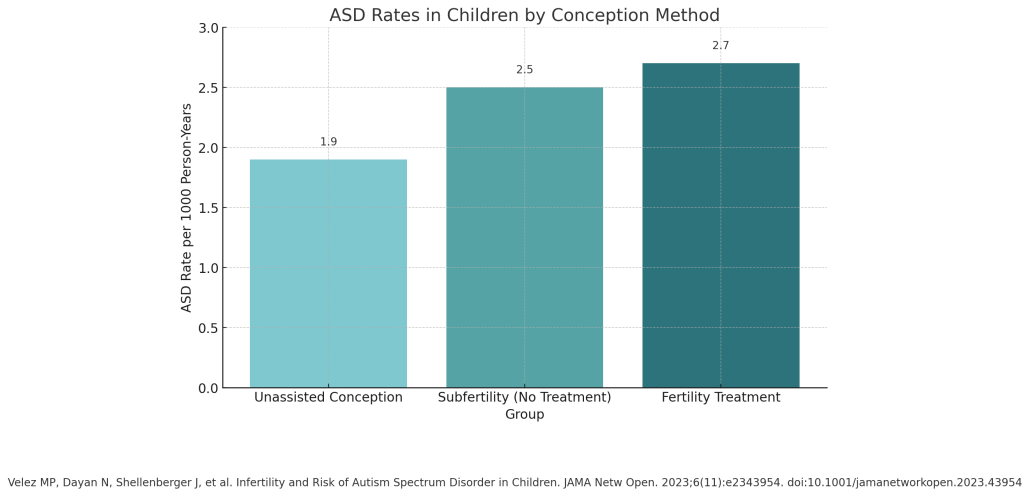IVF and Autism: What the Science Says

As the use of IVF and other assisted reproductive technologies has grown, so has the interest in understanding their long-term implications. One area of concern has been the potential link between IVF and autism spectrum disorders (ASD).
The most recent and comprehensive studies suggest that children of infertile parents may have a slightly higher risk of ASD, regardless of whether they underwent fertility treatments. The current scientific consensus is that infertility itself, rather than IVF and related fertility treatments, are the factors that may slightly increase the risk of ASD.
In this article, we’ll explore the recent research on links between infertility, IVF, and the risk of developing autism. By unpacking the findings from the most recent studies, we’ll offer a clearer picture of potential risks and provide reassurance for parents and prospective parents who rely on IVF to grow their families.
Theorized But Unsubstantiated Links Between IVF and ASD
Though unsubstantiated, there are a few theorized links between In Vitro Fertilization (IVF) itself (and not underlying subfertility factors) and Autism Spectrum Disorder (ASD). These include:
- The IVF procedures, such as ovarian stimulation, embryo culture, and freezing, and thawing of embryos, might lead to epigenetic changes that could impact neurodevelopment.4
- Intracytoplasmic sperm injection (ICSI), which involves injecting a single sperm directly into an egg, may potentially introduce risks related to sperm quality and subsequent embryonic development.
- The hormonal treatments used to stimulate the production of multiple eggs, and prepare the uterus for implantation may influence fetal development in ways that are not yet fully understood.
These factors are often cited as speculative or associative links between IVF and autism. Extensive recent research has not found any causal links between these elements of IVF and increased incidences of ASD. Let’s take a closer look at what the research has to say.
For example, the authors of large-scale 2020 study by the Massachusettes Department of Public Health and Boston University exploring data from over 450,000 births, concluded: “Compared to children born to Fertile women, children born to ART, ICSI, or IVF, or Subfertile are not at increased risk of receiving an ASD diagnosis.”
Likewise, authors of a 2023 study looking at 1.3 million children concluded: “there was a slightly higher risk of ASD in those born to an individual with infertility independent of fertility treatment, which appeared partly mediated by certain adverse pregnancy outcomes.”
Studies Exploring IVF and Autism
The most comprehensive study to date looking at various links between IVF and autism was published in 2023.
Researchers examined data from 1.3 million children from Ontario, Canada, and found the following rates of ASD:
- 1.9 per 1000 person-years in children conceived without fertility assistance.
- 2.5 per 1000 person-years in children born to parents with infertility (subfertility) who did not receive treatment.
- 2.7 per 1000 person-years in children conceived through fertility treatments.
Note: “person-years” are a unit of measurement that accounts for both the number of people in a study and the amount of time each person spends in the study.
The study suggests a slightly higher risk of ASD in children born to individuals with infertility and a non-significant increase in those who received treatment.

How Pregnancy Complications Influence ASD Risk Based on Conception Method
Digging deeper, the researchers looked at how certain pregnancy and birth complications might influence this relationship between infertility/subfertility and ASD.4
Keep in mind that the following percent increases are relative, and not absolute. For example, a seemingly large 29% increase only accounts for an increase from 18.5 to 24.6 diagnoses of autism per 1000 births.
Here’s a breakdown of the impact that these complications had on ASD risk for children born via IVF with Intracytoplasmic Sperm Injection (ICSI) :
- Preeclampsia: Less than 10% influence and not statistically significant.
- Cesarean birth: 29% influence on ASD risk.
- Multifetal (twins, triplets, etc) pregnancy: 78% influence on ASD risk.
- Preterm birth: 50% influence on ASD risk.
- Severe neonatal morbidity: 25% influence on ASD risk.
Here’s the impact of some of these same factors on children born to the subfertility group with no treatment:
- Preeclampsia’s influence remained low at less than 7%.
- Planned Cesarean Delivery had a 57.1% influence.
- Severe Neonatal Morbidity had an 88% influence.
- Caesarian birth has a 69% influence.
The study reveals that certain pregnancy and birth complications may impact the likelihood of ASD in children when fertility treatments like IVF or ICSI are involved. However, it is not the IVF or ICSI that is responsible for the increased likelihood of ASD, but the subfertility/infertility issues that necessitate the use of IVF and ICSI, and that contribute to pregnancy and birth complications.
Understanding these mediating factors can help in developing strategies to mitigate these risks and improve outcomes for children conceived through IVF.
Comparative Risk of Autism Diagnosis: Assisted Reproduction vs. Fertility Issues vs. Without Fertility Issues
In a 2019 study, researchers examined whether children conceived through assisted reproductive technology (ART), such as IVF or ICSI, or born to women with fertility issues but no ART, are at a higher risk of developing autism compared to children born to women without fertility issues.
The study included over 460,000 births and found no significant difference in the risk of autism between children conceived through ART, those born to subfertile women, and those born to fertile women. This means that the way a child is conceived does not significantly affect their likelihood of developing autism.
Let’s look at a summary of the study’s findings.
The study included:
- 10,147 children born using assisted reproductive technology (ART):
- 8,072 children born to women with subfertility issues but no ART.
- 441,898 children born to women without subfertility issues or ART (fertile).
ART Group (IVF with standard or ICSI Fertilization and Fresh or Frozen Transfer):
- Odds Ratio (OR): 1.07. Children conceived through ART have a 7% higher chance of developing ASD compared to children conceived naturally, but this difference is not statistically significant (it could be due to chance).
Subfertile Group:
- Odds Ratio (OR): 1.11. Children born to subfertile women have an 11% higher chance of developing ASD compared to children conceived naturally, but this difference is not statistically significant.
IVF Group (with fresh transfer and standard petri dish fertilization):
- Odds Ratio (OR): 0.91
- Interpretation: Children conceived through IVF have a 9% lower chance of developing ASD compared to children conceived naturally, but this difference is not statistically significant.
ICSI Group (IVF with ICSI):
- Odds Ratio (OR): 1.13. Children conceived through ICSI have a 13% higher chance of developing ASD compared to children conceived naturally, but this difference is not statistically significant.
IVF and Autism: The Bottom Line
Recent comprehensive studies, including large-scale analyses, suggest that while children conceived through assisted reproductive technology (ART) like IVF may have marginally higher odds of developing ASD, these differences are not statistically significant. The observed increase in ASD risk is likely related to the underlying infertility issues that necessitate ART, rather than the ART procedures themselves.
Pregnancy and birth complications, such as preterm birth, cesarean delivery, and severe neonatal morbidity, may impact the likelihood of ASD but are not directly caused by IVF or ICSI.
While the way a child is conceived (naturally, through IVF, or other ART methods) does not significantly affect their likelihood of developing autism, ongoing research and careful management of pregnancy and birth complications can reduce any associated risks. Parents and prospective parents relying on IVF can find reassurance in these findings as they make informed decisions about growing their families.

